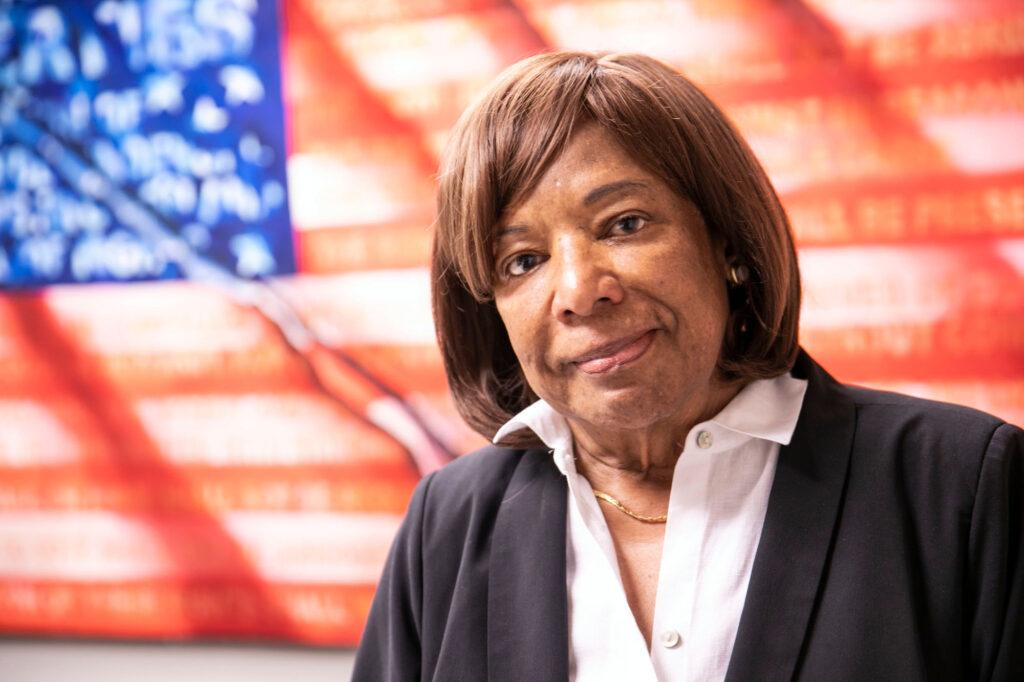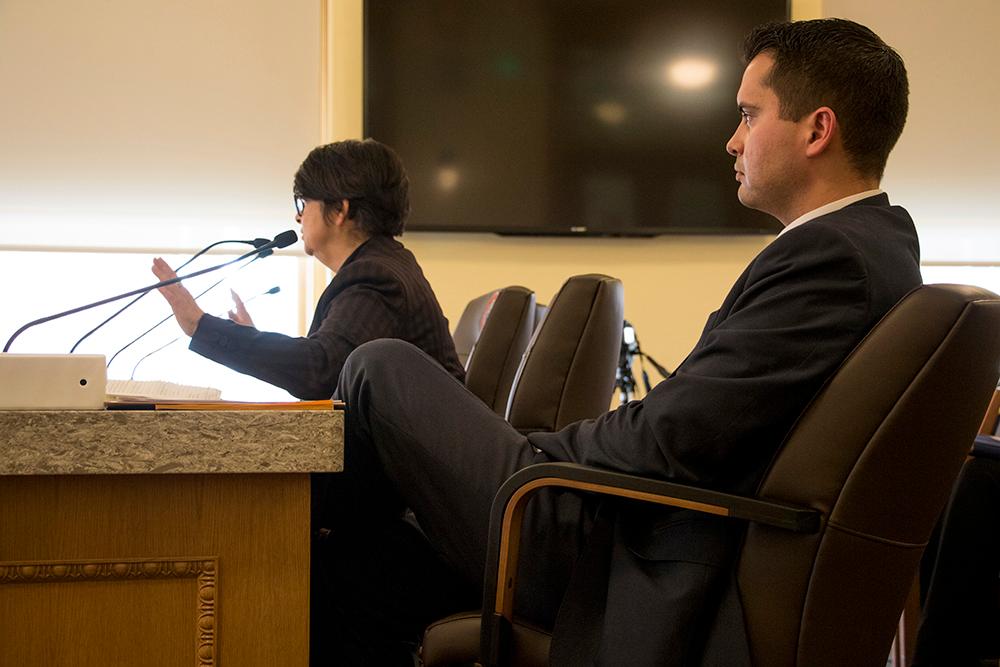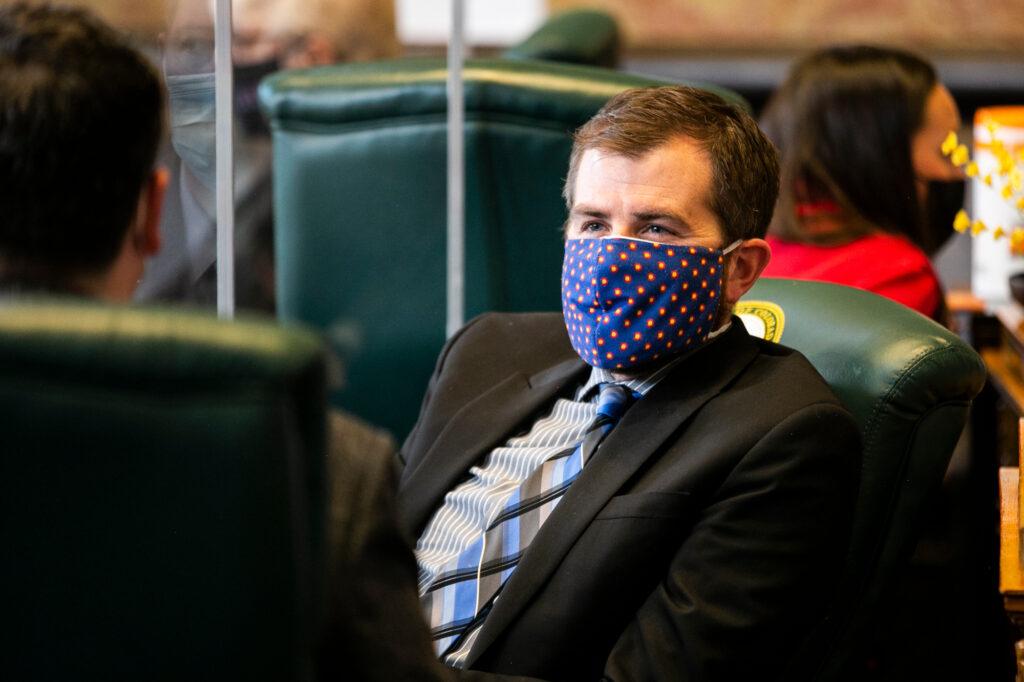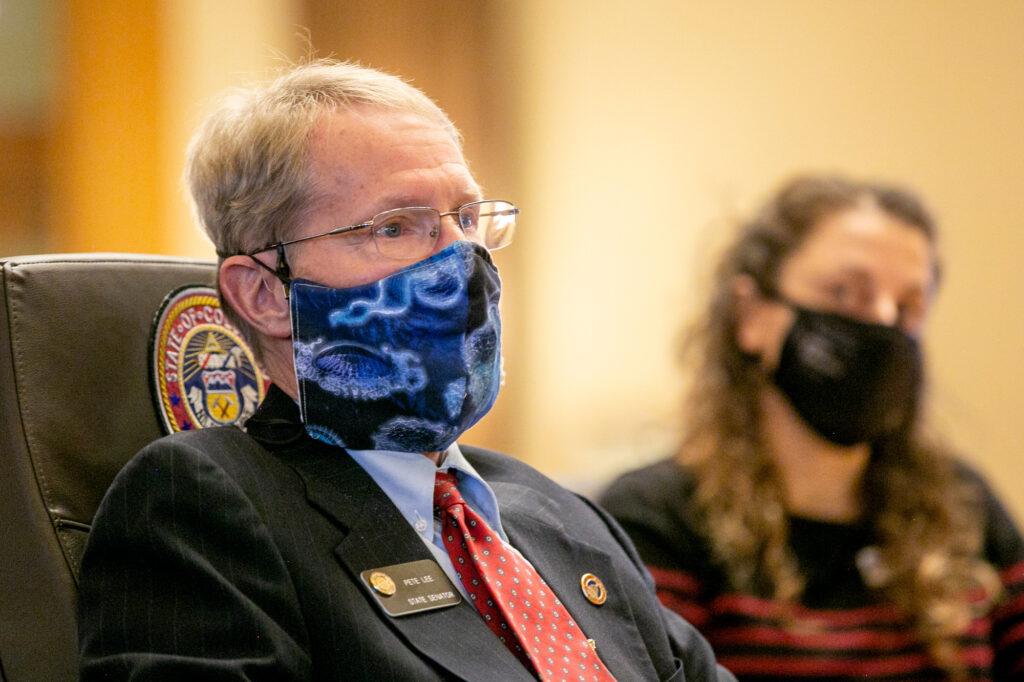
This is a joint story with The Colorado Sun, a journalist-owned, award-winning news outlet based in Denver that strives to cover all of Colorado so that our state can better understand itself. See more from The Sun by signing up for The Sunriser newsletter.
The ACLU of Colorado team credited with helping pass a slate of sweeping criminal justice reform measures abruptly resigned this month amid questions about whether the organization — powered by a jump in donations and a favorable political climate — was too aggressive in wielding its new status as one of the most influential groups at the state Capitol.
The departures come after a shift in strategy for the nonpartisan civil rights nonprofit, which has worked in recent years to abolish Colorado’s death penalty, reimagine policing and require that people who are arrested are quickly seen by a judge.
The group helps write bills, steer lawmakers and marshal powerful grassroots networks to testify on behalf of criminal justice reform measures with an emphasis on tackling systemic injustice.
“We really want to move from being defense to being offense,” said Deborah Richardson, the new head of the ACLU of Colorado, who started in March. “Those who have been disenfranchised in this state, they deserve this power, they deserve this advocacy because no one else is speaking up for them in a way they need to be heard.”
But the organization’s success has come at a cost.
The group’s signature bill this year was rejected in a tangle of controversy as the pressure the ACLU exerted frustrated lawmakers on both sides of the aisle. The organization has also been accused of bullying by the law enforcement community.
“They've gone from watchdog to pit bull,” said Colorado Springs Mayor John Suthers, a Republican who served as Colorado’s attorney general and U.S. attorney.
Advocates defend the ACLU’s work, saying it has led to badly needed change.
“We have made significant gains in Colorado,” said state Rep. Leslie Herod, a Denver Democrat who has worked on much of the ACLU’s priority legislation, including sweeping police reform measures, “and it's important that we understand that they're long-term gains.”
The Colorado Sun teamed up with Colorado Public Radio to interview more than a dozen lawmakers, lobbyists and top staffers at the ACLU of Colorado. The reporting revealed that as the organization grew in size and power, it built on its work in courthouses to influence the Colorado House and Senate.

The ACLU wasn’t always a policy powerhouse
The ACLU of Colorado’s roots date back to 1952. As recently as 30 years ago, it employed just a handful of staffers and most of their work was in courtrooms, suing and defending people in the name of constitutional liberties.
But the 2016 election of Donald Trump significantly swelled contributions and excitement about the ACLU of Colorado, as concerns on the left mounted about issues like abortion rights and immigration policy.
The organization’s revenue doubled to $2.8 million in 2017 from $1.4 million in 2014, according to federal tax filings, driven by skyrocketing donations and allowing it to hire so many more staffers the ACLU had to expand its downtown Denver office space.
“Immediately after the election, it seemed that many people were looking to the ACLU to be the organization that was going to deal with this new, sudden and somewhat surprising threat to civil liberties,” said Mark Silverstein, the ACLU of Colorado’s legal director. “And people started sending us money without us even asking.”
Silverstein remembers being told of bands playing at bars and dedicating some percentage of their earnings to the ACLU.
“I was congratulating our development director,” Silverstein said. “I'm like, ‘amazing work.’ She said, ‘I didn't do it, Donald Trump did.’”
Then, in 2019, Democrats won control of the Colorado legislature, which gave the ACLU the ability to translate its growth into policy wins. Additionally, the murder of George Floyd by police in Minneapolis last year led to cries for the kinds of policy changes the ACLU of Colorado had been pushing for.
Unlike other groups that lobby state lawmakers, the ACLU of Colorado doesn’t spend money in statehouse elections. Rather, they exert power through a vast grassroots network of supporters who can be uncompromising in their pursuit of change.
“That kind of activism is more like how the NRA operates on the other side of the spectrum,” said Tom Raynes, who leads the Colorado District Attorneys’ Council. “They're very similar.”
But the ACLU of Colorado wasn’t always a policy powerhouse.
For most of its existence, the Colorado affiliate and its national parent were responsive organizations, fighting against alleged First Amendment violations and representing even Nazis and their rights in court.
Richardson says her organization is now placing more emphasis on fighting for racial justice and that it’s playing both offense and defense as part of a proactive strategic national initiative intended to prevent the kind of wrongdoing that the organization is known for filing lawsuits over.
“We’re holding the line and pushing forward toward righting the wrongs that exist,” she said.
The Colorado branch of the ACLU has received resources from the national organization over the past five years because it's considered a pivotal affiliate that “can move the needle of social change forward,” Richardson said.
“They have helped us invest in our campaigns, public education work, our communications work, public policy, obviously, as well as our legal work,” she said.
The changes at the ACLU’s Colorado chapter come amid shifts at the national organization, too. The New York Times reported earlier this year that the ACLU’s staff is debating whether the organization is straying too far from its free speech roots toward advocacy for progressive causes.
The national organization faced an internal reckoning after its affiliate in Virginia successfully represented white supremacists’ right to protest in Charlottesville, Virginia, in 2017. After the demonstration turned deadly when a man intentionally drove his car into a group of counter-protesters, the ACLU launched a review process ahead of legal work defending speech with which it disagrees.
Recently, however, the ACLU of Colorado filed a brief in support of the free speech rights of a Cherry Creek School District student who was expelled after sending a Snapchat joking about killing Jews.

Three policy staffers abruptly depart
Denise Maes, the ACLU of Colorado’s public policy director, and Rebecca Wallace, the organization’s senior staff attorney and senior policy counsel, announced their resignations earlier this month.
Maes, who started her job at the ACLU in January 2012 after working for the Obama administration, said she’s “very proud of the work I accomplished at the ACLU and, perhaps, more importantly, the direct impact our work had on the people of Colorado.”
“We accomplished a lot,” she said. “I’m looking forward to doing that work, albeit in a different space.”
Maes said she decided to leave the ACLU because the organization is rethinking its direction.
“The direction it was going was not going to align with where I was hoping things would go,” she said.
Wallace, who had been with the ACLU for almost 11 years, commented Thursday on Twitter about her departure.
Elisabeth Epps, a community activist who worked as a policy contractor with the ACLU, also decided to split from the organization. She said her decision “certainly was heavily informed by Denise and Rebecca’s choices,” but that she also felt she could be more effective in changing pre-trial policies, her main focus, through the Colorado Freedom Fund where she is the executive director. Wallace will serve as senior policy counsel at the nonprofit.
Epps said she is leaving the ACLU on good terms and is proud of her work there.
Maurice Scott, chair of the ACLU of Colorado’s board of directors, denied that the organization has shifted direction.
"In terms of our mission, nothing has changed,” he said in a written statement. “We are not abandoning criminal legal reform or any issue that leads to ending systemic injustice. We will continue to convene communities across Colorado to inform the work we do, and how we go about that work. Our mission remains the same and we will continue to protect, defend and extend the civil rights and civil liberties of all people in Colorado through litigation, education and advocacy.”
But the three women who have left the ACLU of Colorado oversaw the group’s work at the Capitol and spent years building relationships with lawmakers. The ACLU’s successes at the legislature were in no small part because of them, Capitol insiders say.
Maes is only the ACLU of Colorado’s second public policy director. She took over the position from Jessie Ulibarri, who went on to serve a term as a Democratic state senator. Ulibarri had the job from December 2010 to November 2011.
“This build of capital at the Capitol has not been an overnight success,” Maes said in an interview a few weeks before her resignation. “It's been some hard work and some smart minds around the table.”
And Maes said the ACLU hasn't always been willing to compromise — unlike other groups at the Capitol.
“Our role at the Capitol is not simply to champion a legislative win,” she said. “It is to champion a legislative win that matters, that has impact — that really changes the lives of individuals who really need that work. The bill has to move the dial. It has to make a difference. That’s being true to our mission, which is very different than a lobbyist’s mission.”
Maes added: “We are going to push the envelope. We are going to force legislators to take hard votes.”
That passion may have been taken too far earlier this year during the debate of ACLU’s signature piece of legislation — a measure to limit when officers can arrest and detain people.
The first proposal, Senate Bill 62, would have restricted arrests, with some exceptions, to people accused of Class 1, 2 or 3 felonies, crimes the state considers the most serious, like murder and assault where the victim is seriously injured. When that legislation failed to garner enough support for passage, a pared-back version of the policy was introduced in the form of Senate Bill 273.
A major argument for the legislation was that it would prevent the kind of arrests that preceded the murder of George Floyd, who was taken into custody on suspicion of using counterfeit money, and the Denver jail death of Michael Marshall, who was arrested on a trespassing charge and kept behind bars because he couldn’t pay his $100 bond.
Senate Bill 273 cleared the Senate but was rejected in a House committee after two Democrats — state Reps. Matt Gray of Broomfield and Shannon Bird of Westminster — joined Republicans in voting “no.”

Gray and Bird faced significant backlash over their vote, including from the ACLU.
“They chose to use their committee position to block a bill urged by their DA, Black & Brown colleagues & constituents, & supported by their caucus,” Wallace said on Twitter. “That’s their flex.”
Maes also called Bird and Gray out by name at a recent ACLU of Colorado fundraising event, saying they were responsible for killing the measure.
At a Broomfield County Democrats meeting over the summer, several criminal justice activists showed up at the virtual gathering to grill Gray on his vote.
“There’s a great number of these reforms I could vote for,” Gray, who declined an interview request for this story, said during the meeting. But Gray explained he wanted changes made to the measure — including one expanding officers’ discretion to arrest people accused of misdemeanors if they feel it’s necessary. But the sponsors were unwilling to make those amendments. Gray, in turn, was unwilling to vote for the bill.
The intense support for the bill among criminal justice reform advocates also spilled over to even private business owners who simply testified against the measures.
Connie Brenton, who owns Art Mart Gifts on Boulder’s Pearl Street Mall, said activists started showing up at her store to complain about her public statements against Senate Bills 62 and 273 — testimony that was prompted by a string of break-ins and assaults on her employees.
One guy filmed her. Another erupted in anger and yelled at her to the point she had to call the police. Brenton said she didn’t know where the activists were from — and there’s no indication they were affiliated with the ACLU — but she had never seen them before she testified against the measures.
“They wanted my voice silenced,” she said.

“Should have done a better job”
Some of the ACLU’s greatest allies say the organization could have handled the situation around Senate Bills 62 and 273 better.
“I think that sometimes when you are very successful and you start to have that track record of success that maybe you hadn't had before, maybe you get your own blind spots,” Herod said. “And maybe there's a little bit of cockiness or heavy-handedness that doesn't work well with every personality.”
Even Maes, who is still contemplating her next career steps, said she learned from the experience. Maes said the ACLU “should have done a better job” in branding messages on legislation. Not doing so left a vacuum for activists to fill.
“There were a lot of folks who were really aggressive on this bill,” she said. “I don’t think it was the ACLU.”
But Senate Majority Leader Steve Fenberg, one of the top Democrats at the Capitol, said he thinks the ACLU’s recent wins at the Capitol have put its long-term goals at risk.
“If you want structural change to be sustainable,” Fenberg said, “you can’t look at it as just a win at any cost, legislative session by legislative session.”
Law enforcement, in particular, was disheartened by how negotiations over Senate Bills 62 and 273 went.
Former Steamboat Springs police Chief Cory Christensen, who until his recent retirement was the head of the Colorado Association of Chiefs of Police, said he’d worked successfully with the ACLU in the past on body-worn camera legislation and other criminal justice bills.
“It was a very positive experience,” he said. “I appreciated the viewpoints. I appreciated the things that maybe I hadn't thought about that would be important to the civil liberties of humans.”
But the tone around Senate Bills 62 and 273 effort was different.
“They argued with us,” Christensen said. “I was the first to lead off and they immediately interrupted me and just bullied me. I never got to speak again in a 30-minute meeting. I found it disheartening, to be honest. It was argumentative and pushing the rights of one group over the rights of another.”
Douglas County Sheriff Tony Spurlock, a Republican who used to lead the County Sheriffs of Colorado, said he doesn’t think the ACLU “is interested in what law enforcement has to say” and that the legislation they push in Colorado is sometimes responding to issues in other states.
“We should have a working relationship with the ACLU where we can come together and work on the issues of Colorado,” he said. “Not the issues of Minnesota or Missouri.”
Suthers, the former attorney general, said it’s dangerous for lawmakers to be listening so much to the ACLU.
“You don't look to the ACLU for advice on public safety,” he said. “You look to the ACLU for how to keep people out of jail. You probably need to talk to somebody else about what the impact is on public safety.”

“They write them, they lobby them and they do a good job at it”
State Sen. Pete Lee, a Colorado Springs Democrat who has worked on a number of ACLU-backed bills, including Senate Bills 273 and 62, sees the organization as an obvious partner in his work to change the criminal justice system because of their expertise.
“In the last couple of years, when I've been more focused on criminal justice reform, the ACLU has come to me and said, ‘we can help you on this bill, senator,’” Lee said. “And I've said, ‘come forth.’”
Richardson, the ACLU’s director, said she’s proud of the power her organization has at the legislature. The failure of Senate Bills 62 and 273 represented just one policy loss out of 11 priority measures the ACLU of Colorado backed at the legislature this year.
“When you say that we’re powerful, I consider that a compliment because that’s exactly what we want to be,” she said. “It’s very strategic. This didn't just happen this way.”
But some question whether the influence, which really grew after Democrats took control of the legislature in 2019, has gone too far.
“They write (bills), they lobby them and they do a good job at it,” said Raynes, the president of the Colorado District Attorneys’ Council.
Lee said when he first arrived at the Capitol, he wrote his own bills and worked on them himself. Then he realized he could get help from groups like the ACLU.
“I didn't know there's another way to do things and that is to engage advocate stakeholders to do the work for me,” he said. The ACLU, Lee said, is “brilliant, and they have the research, and they have the knowledge, and they have the witnesses, and they can really help lobby the bills.”
But it’s not just Lee. Several lawmakers have worked with the ACLU on legislation in recent years, relying on the organization’s network.
“They have influence because they have built relationships with legislators, especially legislators who are looking to do criminal justice reform, and have made themselves the go-to organization and starting point for legislation development,” Herod said.
Herod said that even though the ACLU doesn’t directly contribute to campaigns like other groups that lobby at the Capitol, they have power over lawmakers — particularly those with ambition — because they have so much data and connections to grassroots groups.
“Literally, if I pick up the phone and need something, they will do it,” she said. “I think that matters.”
State Sen. Bob Gardner, the ranking Republican on the Colorado Senate Judiciary Committee, said he often negotiates with the ACLU over legislation rather than the Democrats who sponsor their bills.
“I repeatedly found myself in a situation where my colleague, Sen. (John) Cooke, and I were asked to come to a negotiation with ‘the sponsors’ of a particular bill only to walk in and find the sponsor is sitting there with the ACLU,” Gardner said, referring to the Republican lawmaker from Greeley.
Maes denied that the ACLU of Colorado has written legislation introduced at the Capitol, but she admitted that the organization has played a big role in bills.
“We might give proposed text. We might give proposed bullet points. We develop fact sheets. We do work with a drafter when a draft of a bill comes back and there's question marks,” she said. “All of this is in collaboration with the bill sponsors.”
Gardner may not always agree with the ACLU of Colorado’s positions, but he says he can’t criticize them for wielding their power.
“They have the influence that they're given,” Gardner said. “They have the influence that elected legislators allow them. Don't blame the association or the interest group for taking advantage of the influence they have.”
Editor's Note: This story has been updated to reflect a comment from Rebecca Wallace on Twitter.









